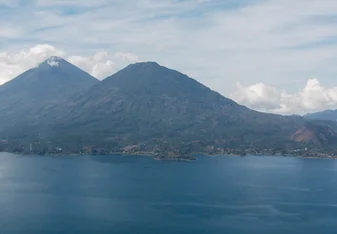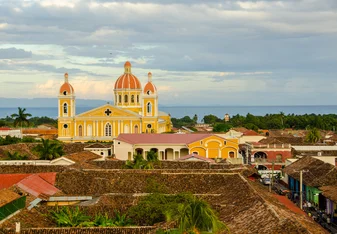TEFL Courses in Costa Rica
About
Earn your TEFL certificate in one of the most beautiful and bio-diverse countries on the planet. With over 500,000 different plants and animals, Costa Rica is a natural wonder. Cloud forests, jungles, beaches, volcanos, and waterfall gardens are all in your backyard. Every night you can sit and watch some of the most stunning sunsets you will ever see. Seriously, what more could you ask for?
Course Types
There are a number of factors you should consider when choosing a TEFL course in Costa Rica:
- Authentic, practical experience in a real English classroom is key! Don't consider a course that doesn't require you to actually teach. It's only through practical teaching, with feedback from a professional trainer, that you will develop the confidence to teach ESL anywhere in the world.
- Observation of experienced English teachers at work — a quality TEFL course will provide opportunities for you to observe and learn from other teachers in action.
- Look for courses that are at least 120 hours long. Prospective employers are far less impressed by short courses and online-only certification programs. Quality TEFL courses are intense and challenging — as they should be! The curriculum should cover: foundational teaching techniques unique to ESL, learning and teaching theory, English grammar, and the methodologies for teaching ESL anywhere in the world… plus a ton more.
- Look for programs that offer plenty of support. When you're reading reviews about TEFL programs, look for graduates who were impressed with their TEFL trainers, and who received support from the entire staff in regards to housing, health, and overall happiness. You should also expect job assistance including resume writing, job contacts, contract guidance, etc.
4-Week TEFL Courses:
4-week TEFL courses are the most common type of course offered in Costa Rica. These are courses in which you complete the entire program in-country. Students benefit from the supportive community of other teachers and staff, develop a close, professional relationship with their TEFL trainer(s) and bond with classmates—often forming lifelong friendships. Look for courses that are internationally accredited, offer small class size, at least 120 hours of instruction, observation of experienced teachers, and most importantly be sure the course offers a practical teaching component in real classroom settings.
Hybrid TEFL Courses:
A combination of self-study and classroom learning (hybrid programs) is another common type of TEFL course offered in Costa Rica. These courses are designed for people who prefer to complete some of the theory and reading work online. Then the final part of the course, including the practical teaching component, is completed in-country.
Most TEFL programs will help you get suitable housing during the course. Host families are always a great way to learn about the area and they will also include meals. Apartments, hostels, and hotels are also good options and offer more privacy, but they are more expensive.
Planning Your Trip
When and Where to Look:
You've got two main options for TEFL course locations in Costa Rica: 1) City or 2) Beach. Many TEFL courses are offered through private language institutes in the capitol city of San Jose. TEFL certification programs are also offered in some of the beautiful coastal towns. Conveniently, programs are offered year-round in most of these locations.
Qualifications:
Whereas you do not need a Bachelor’s degree to teach in Costa Rica, the best places to teach will expect you to have one. Master’s degrees are helpful, but you will normally not be paid significantly more if you hold one. There is also work to be found with just a TEFL certificate and no university degree (most programs will not require you to have a Bachelor's to enroll).
You do not need to be a native English speaker to enroll in a TEFL course in Costa Rica. However, your level of English needs to be fluent and will be assessed by the school before allowing you to enroll.
Post-TEFL Resources:
There are plenty of teaching opportunities throughout Costa Rica. The Costa Rican economy is built on tourism, so Costa Ricans need to learn English for job security and career advancement. Thus, English teaching jobs are plentiful in Costa Rica. Most positions are found in the Central Valley region in the cities of San Jose, Heredia, and Cartago (Heredia & Cartago are extremely close to San Jose). There are also plenty of opportunities to be found in the public and private schools in more rural locations and coastal beach towns. The pay is often less, but the quality of life is superb.
Private language schools offer the most common positions available to English teachers and they hire year-round. The public school year runs from February/March to November, while many international schools follow the North American school year calendar. Often language institutes that offer TEFL certification programs are larger schools that are always looking for new teachers. This means you can complete your TEFL course and start working for them right away!
Schools in Costa Rica and all throughout Central America prefer teachers to be in-country. Once you complete your course, you're at a huge advantage over other applicants not in the country. Go into the school you would like to teach, drop off your international resume and introduce yourself with a smile!
Cost of Living:
Cost of living in Costa Rica is slightly higher than other Central American countries, but you can make ends meet on $500 to $1,000 USD per month. Rent is typically between $150-$350 USD per month plus utilities which vary from $40-$100 USD per month.
The cost of food is higher in Costa Rica compared to its neighbors with groceries from the local super market costing around $30-40 USD per week. Eating out can vary from cheap lunches bought at a local “Soda” for only $5 USD and the average dinner out ringing in around $12-$20 USD.
Contributed by Karen Wilke
New Jobs
View the latest teaching job postings on our job board.
























